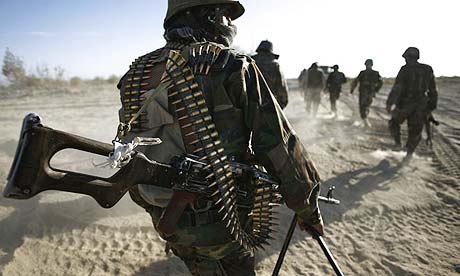
Afghan soldiers patrol a Taliban stronghold in Kandahar. An Afghan prosecutor has issued an arrest warrant for a US special forces officer over the murder of a police chief by US-trained militia. Photograph: Finbarr O’Reilly/Reuters
An Afghan prosecutor has issued an arrest warrant for an American special forces commander over allegations that a police chief was murdered by a US-trained militia.
Brigadier General Ghulam Ranjbar, the chief military prosecutor in Kabul, has accused the US of creating an outlaw militia which allegedly shot dead Matiullah Qateh, the chief of police in the city of Kandahar.
The militia, which Ranjbar claimed is armed and trained by US special forces, also allegedly killed Kandahar's head of criminal investigations and two other officers, when they attempted to free one of their members from a courthouse.
"We lost one this country's best law enforcement officers for the [attempted] release of a mercenary," said Ranjbar, interviewed for a film to be shown on Channel 4 News tomorrow.
He accused American officials of refusing to hand over evidence or to permit his investigators to interview the special forces commander, known to Afghans only as "John or Johnny", who he alleges sanctioned the raid.
The arrest warrant, which has been circulated to border posts and airports, is an embarrassment for the US military, which is facing growing criticism for links to militias controlled by warlords. In Kandahar, the militias have been accused of murder, rape and extortion.
Ranjbar said an investigation found that the force that killed Qateh operated from Camp Gecko, in the hills outside Kandahar, a base for both US special forces and the CIA.
Officials in Kandahar said the militia supplies guards and is trained to work alongside special forces and intelligence officials in raids against Taliban targets.
"If you go to Kandahar, people say these guys pretend to be interpreters but they carry out night raids and assassinations," said Ranjbar. "We hear lots of strange and shocking stories."
He claimed that suspects arrested for the courthouse raid had confessed to being part of a 300-strong militia unit run by "Johnny". They said they "could not move a muscle and could not leave their base without Johnny's orders" Ranjbar said. "He was the head of the group and they [the Americans] were the ones paying them."
Colonel Wayne Shanks, a spokesman for the US military, denied that any US or other coalition forces were involved in the attack, and said those involved "were not acting on behalf of US or international forces".
But, according to the Afghan account, the militia known locally as the "Kandahar Strike Force", or the "Kandahar Special Group", arrived at the courthouse last June with US-supplied uniforms, vehicles and weapons. They demanded the release of a comrade held for a traffic offence. When police were called to the scene by terrified court officials, the militia opened fire, killing Qateh, and three other policemen.
"The police chief took two steps forward and that's when they fired," claimed a witness, who showed Channel 4 the crime scene, pockmarked with bullet holes. "Within a couple of seconds the chief was sprayed with bullets. Then the head of CID came over. He pulled out his pistol and prepared to fire, but he was shot from behind."
The involvement of the Camp Gecko militia is politically sensitive because of its alleged close ties to Ahmed WaliKarzai, brother of the Afghan president, Hamid Karzai. Militia members claim to have been recruited by associates of Ahmed Wali, who press reports have claimed is on the CIA payroll.
Interviewed by telephone, Ahmed Wali called for an amnesty for the 41 men convicted of Qateh's murder, but denied he had any militia connections.
Local militias have also been linked to a raid on 10 November last year when US and Afghan troops allegedly burst into the home of Janan Abdullah, 23, riddled him with bullets, and left his wife paralysed and the rest of his family traumatised.
"Nothing was left undamaged, they shot at everything," said one of Janan's uncles. "He was just lying in bed. I'd say they fired 200 bullets at him."
The family claimed it was Afghans who did the shooting and stole thousands of pounds in cash. "We were surprised," said the uncle. "It was our own people – Pashtuns – doing this to us."
A US military spokesman said they had "no record" of the raid. However, the family were given medical treatment at Camp Gecko, leading to suspicions that it was the same Afghan militia that allegedly killed the police chief.
